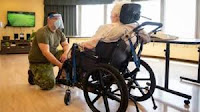By Wesley J Smith
When Dame Cecily Saunders created the modern hospice movement, she adamantly rejected assisted suicide as an acceptable hospice activity. Indeed, when I interviewed Saunders for the original edition of my book Culture of Death, she stated unequivocally that assisted suicide "rejects the equal dignity of my patients."
That is why she designed hospice to engage in active suicide prevention when patients expressed suicidal desires as one of its most important services alongside pain control, social services, chaplaincy, and the like. In other words, as conceived by Saunders, hospices would be assisted-suicide-free zones.
Saunders would be spinning in her grave — she died in the St. Christopher’s Hospice, which she founded — if she read the proposed policy around assisted suicide that has been published by the Hospice and Palliative Nurses Association (HPNA). It is both abject and a betrayal of Saunders’s humanitarian vision for the care of dying people. And the statement contains not a hint of the many problems and abuses that have been associated with “medical aid in dying” (MAID), reasons why the European Court of Human Rights recently ruled that access to assisted suicide is not a human right.
First, the proposed policy position embraces the word-engineering tactic of calling assisted suicide MAID. I have repeatedly criticized this euphemistic deflection and won’t repeat those thoughts here.
Then, the statement calls participation in suicide a form of palliative care. From the proposed “HPNA Position Statement: Medical Aid in Dying (MAiD):
HPNA acknowledges that some patients with terminal illnesses may seek medical aid in dying (MAiD) as an end-of-life care option where legally available. Although suffering is not a requirement in order to qualify for MAiD in the United States, some patients may utilize this option to relieve their suffering, which is consistent with the ethical principles of palliative nursing care. Suffering at the end of life may be caused by loss of control; death anxiety; feeling like a burden; and refractory physical, social, emotional, spiritual, and existential symptoms. MAiD is consistent with the fundamental ethical principles of patient autonomy and beneficence.It is actually the opposite. As Dame Cecily knew so well, the proper compassionate approach to suicidal ideation — whether in terminally ill people or otherwise — is suicide prevention, not participation and facilitation by medical professionals, of all people. Indeed, when I trained as a hospice volunteer in the 1990s, I was strictly instructed to alert the multidisciplinary team if a patient ever indicated a desire for suicide or immediate death.
Here’s the abject part:
HPNA adopts a stance of engaged neutrality regarding whether MAiD should be legally permitted or prohibited.What in the hell does “engaged neutrality” even mean? But they really aren’t fooling anybody. The long statement is almost all pro, pro, pro. Even its suggested “resources” for further information are one-sided.
The policy urges nurses to participate in assisted suicide absent a moral objection. The only good news here is that the statement respects medical conscience and the right of nonparticipation. (One would hope all palliation and hospice nurses would refuse to be complicit in any patient’s suicide!):
Nursing care for patients considering MAiD (and their families) is crucial to ensure that patients and families are not overtly or inadvertently disenfranchised or stigmatized as they proceed with MAiD and that they experience a safe and comfortable death, free from complications.“Safe” death “free from complications?” Good grief.
Once lethal injection is allowed legally, and eligibility expands beyond the terminally ill — as will eventually happen if the death agenda keeps marching forward — would the HPNA still suggest that nurses do the deed? Reading this proposed statement, I think it would.
The public is invited to comment on this (from my perspective) planned betrayal of vulnerable patients by July 7, which can be done by hitting the public comment link on this page.


















